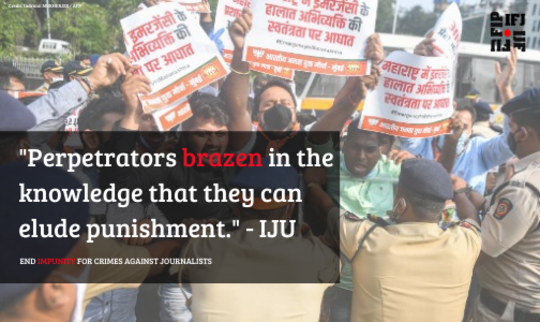India, the world’s largest democracy, has a grim record of at least 55 journalists killed between 2010 and 2020, according to IFJ data. Of the long list of murders and targeted killings, only one case has been resolved. The remainder lie largely cold, waiting for authorities either unwilling or incapable to deliver adequate investigations, let alone bring perpetrators to justice. IJU states that not only is there undeclared censorship, but journalists across the country are facing harassment and intimidation, especially during the ongoing Covid-19 pandemic.
Since the International Day to End Impunity for Crimes against Journalists on November 2, the IFJ has recorded two more attacks on journalists in India. G. Moses, a reporter for Tamilian TV, was hacked to death in Tamil Nadu on November 9, allegedly for his coverage of illegal land grabbing in the area. Vinay Tiwari, a journalist working for local Hindi news website Bundelkhand Times, was seriously injured in an attack by several assailants in the Lalitpur district of Uttar Pradesh on November 7.
The IJU’s letter voiced concerns regarding the indifference and connivance of investigating agencies, stating, “Although police investigations are underway in many cases most of these remain inconclusive. The end result of this inaction is that India’s media remains under grave threat through intensifying harassment and intimidation both online and offline – with perpetrators brazen in the knowledge that they can elude punishment.”
2020 also saw another three journalists’ names added to the country’s long death tally. Shubham Mani Tripathi, a journalist with Kampu Mail, was fatally shot in the largest, and now widely considered most dangerous, state of Uttar Pradesh on June 19, in a suspected retaliatory attack for his critical news coverage regarding sand-mine disputes. Amid the increased number of media rights violation and low rate of justice delivery on crimes against journalists, IFJ Indian affiliates the Indian Journalists Union (IJU) and the National Union of Journalists (NUJ-I) continue to monitor and push India’s government to bring an end to the injustice.
The IJU said: “We urge the government to dispel the impression of indifference in the face of deadly assaults against journalists. There is so much more that can be done with a genuine commitment to fighting impunity. It needs to start with justice for the victims of violence.”
The IFJ said: “The IFJ stands with its affiliates in denouncing the lack of political will to prosecute all crimes against journalists in India. Authorities cannot allow perpetrators to remain unpunished; through inaction, the harassment, intimidation and killings of media workers are permitted to continue. IFJ urges the Indian government to expedite the impartial and timely investigation of crimes against journalists and ensure justice is swift.”

